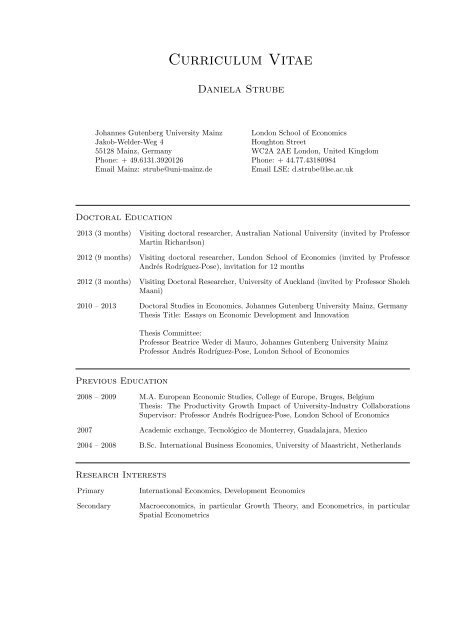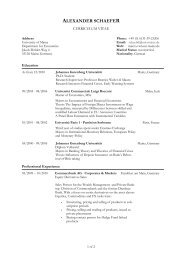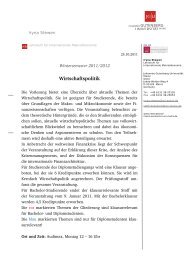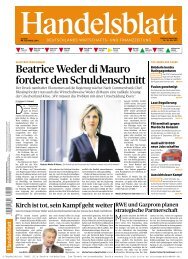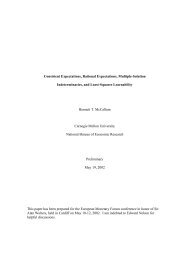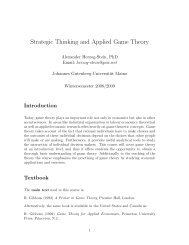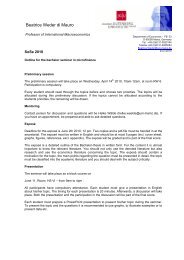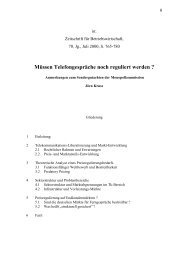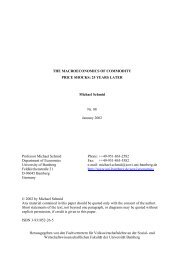Curriculum Vitae - Beatrice Weder di Mauro
Curriculum Vitae - Beatrice Weder di Mauro
Curriculum Vitae - Beatrice Weder di Mauro
Create successful ePaper yourself
Turn your PDF publications into a flip-book with our unique Google optimized e-Paper software.
<strong>Curriculum</strong> <strong>Vitae</strong><br />
Daniela Strube<br />
Johannes Gutenberg University Mainz London School of Economics<br />
Jakob-Welder-Weg 4<br />
Houghton Street<br />
55128 Mainz, Germany WC2A 2AE London, United Kingdom<br />
Phone: + 49.6131.3920126 Phone: + 44.77.43180984<br />
Email Mainz: strube@uni-mainz.de<br />
Email LSE: d.strube@lse.ac.uk<br />
Doctoral Education<br />
2013 (3 months) Visiting doctoral researcher, Australian National University (invited by Professor<br />
Martin Richardson)<br />
2012 (9 months) Visiting doctoral researcher, London School of Economics (invited by Professor<br />
Andrés Rodríguez-Pose), invitation for 12 months<br />
2012 (3 months) Visiting Doctoral Researcher, University of Auckland (invited by Professor Sholeh<br />
Maani)<br />
2010 – 2013 Doctoral Stu<strong>di</strong>es in Economics, Johannes Gutenberg University Mainz, Germany<br />
Thesis Title: Essays on Economic Development and Innovation<br />
Thesis Committee:<br />
Professor <strong>Beatrice</strong> <strong>Weder</strong> <strong>di</strong> <strong>Mauro</strong>, Johannes Gutenberg University Mainz<br />
Professor Andrés Rodríguez-Pose, London School of Economics<br />
Previous Education<br />
2008 – 2009 M.A. European Economic Stu<strong>di</strong>es, College of Europe, Bruges, Belgium<br />
Thesis: The Productivity Growth Impact of University-Industry Collaborations<br />
Supervisor: Professor Andrés Rodríguez-Pose, London School of Economics<br />
2007 Academic exchange, Tecnológico de Monterrey, Guadalajara, Mexico<br />
2004 – 2008 B.Sc. International Business Economics, University of Maastricht, Netherlands<br />
Research Interests<br />
Primary<br />
Secondary<br />
International Economics, Development Economics<br />
Macroeconomics, in particular Growth Theory, and Econometrics, in particular<br />
Spatial Econometrics
Presentations at Academic Conferences<br />
03/2013 Australasian Macroeconomics Workshop (AMW), Canberra<br />
03/2013 Australasian Trade Workshop (ATW), Melbourne<br />
09/2012 Annual Conference of the European Trade Study Group (ETSG), Leuven<br />
08/2012 Annual Conference of the European Regional Science Association (ERSA), Bratislava<br />
11/2011 Annual Conference of the North American Regional Science Council (NARSC),<br />
Miami<br />
06/2011 Third Global Conference on Economic Geography, Seoul<br />
04/2011 Annual Conference of the Regional Stu<strong>di</strong>es Association, Newcastle<br />
Presentations in Seminars and Workshops<br />
01/2013 University of Cambridge<br />
11/2012 London School of Economics<br />
03/2012 University of Auckland<br />
03/2012 Auckland University of Technology<br />
05/2011 Johannes Gutenberg University Mainz<br />
Other Conferences and Summer Schools<br />
2011 Competition and Innovation Summer School, ZEW Mannheim and K.U. Leuven,<br />
Turunc, Turkey<br />
2011 International Autumn School in Spatial Econometrics, Toledo<br />
2010 Essex Summer School in Social Science Data Analysis and Collection<br />
Course: Spatial Econometrics<br />
2005, 2006, 2007 St. Gallen Symposium<br />
Invitation based on the international ”Wings of Excellence” essay competition<br />
2006 Business Today International Conference, New York City<br />
Invitation based on the International ”Business Today” essay competition<br />
2005 Eurotop for Top Students student conference, Maastricht<br />
2005 South American Business Forum, Buenos Aires<br />
Invitation based on the international essay competition of the Instituto Tecnológico<br />
de Buenos Aires
Awards and Scholarships<br />
2011 – 2013 German National Academic Foundation PhD Scholarship<br />
2011 – 2013 Travel awards by the German National Academic Foundation, the German Academic<br />
Exchange Service (DAAD) and the Regional Stu<strong>di</strong>es Association for conference,<br />
study and research travel to Australia, Korea, Mexico, New Zealand, Spain,<br />
the United Kingdom and the United States<br />
2011 Finalist in the North American Regional Science Council (NARSC) Graduate Student<br />
Paper Award<br />
2009 Top of M.A. class of the Economics Department, College of Europe<br />
2008 – 2009 College of Europe Scholarship, German Federal Ministry of Education and Research<br />
2008 – 2009 German Academic Exchange Service (DAAD) Graduate Scholarship<br />
2006 – 2009 German National Academic Foundation Merit Scholarship<br />
2004 Vale<strong>di</strong>ctorian (higher education entrance exam, Abitur)<br />
2002 and 2000 Research award in the History Competition of the Federal President of Germany<br />
Work in Progress<br />
2013 Technological Convergence and Space<br />
Abstract<br />
Over the last two decades, the convergence literature has increasingly <strong>di</strong>smissed convergence<br />
as a universal outcome in favour of convergence clubs and multiple regimes of<br />
growth that are explained by <strong>di</strong>fferences in innovation performance. In this paper, we<br />
present a theory of convergence that does not only consider the technology <strong>di</strong>stance, but<br />
also the spatial <strong>di</strong>stance to lea<strong>di</strong>ng innovators. Technology <strong>di</strong>stance and spatial <strong>di</strong>stance<br />
are opposite forces. A large technology <strong>di</strong>stance facilitates innovation by reaping the ”lowhanging<br />
fruit” of less costly, but effective innovations while a large spatial <strong>di</strong>stance from<br />
the frontier makes successful innovation more <strong>di</strong>fficult to achieve because of the absense<br />
of non-pecuniary externalities from lea<strong>di</strong>ng innovators in the area. We propose a quality<br />
ladders model in continuous space where both convergence dynamics and firm location are<br />
endogenous. Factors of production are mobile and land markets are explicitly modelled.<br />
We find that returns to innovation and innovation costs at both extreme end of the scale<br />
(very low or low high) lead to suboptimal decision by market participants and only the<br />
right balance in the con<strong>di</strong>tions for innovation will facilitate technology upgra<strong>di</strong>ng. Moreover,<br />
optimal con<strong>di</strong>tions are not universal, but vary for <strong>di</strong>fferent locations in an economy.<br />
Locational <strong>di</strong>sadvantages may be so severe for some regions that they may find themselves<br />
caught in a low-growth trap such that they are not able to benefit from their advantage of<br />
backwardness in technology terms. Similarly to the role of critical technology thresholds<br />
that has been described in the literature, we also find threshold effects in the impact<br />
of geographical <strong>di</strong>stance on technological convergence. The assumptions underlying our<br />
theory are supported by original empirical evidence using an endogenous sample splitting<br />
approach for identifying interaction effects and nonlinearities in the impact of location on<br />
innovation and technological convergence.<br />
JEL Codes: O31, O33, O41, R12, R13
2013 Threshold externalities and innovation<br />
Abstract<br />
While the instrumental role of human capital in generating innovation is widely acknowledged,<br />
relatively little attention has been paid to modelling the mechanism of how human<br />
capital in<strong>di</strong>rectly stimulates innovation by improving the productivity of other R&D inputs.<br />
This in<strong>di</strong>rect function of human capital has been formally introduced by Azaria<strong>di</strong>s<br />
and Drazen (1990). Moreover, they suggest that in<strong>di</strong>rect human capital effects may cause<br />
threshold externalities on the productivity of technology. Azaria<strong>di</strong>s and Drazen (1990),<br />
however, assume technology to be exogenous and they fail to provide causal empirical<br />
evidence for such threshold externalities. In this paper, we extend endogenous growth<br />
theory such that it allows for these threshold externalities to occur. Moreover, we provide<br />
empirical evidence regar<strong>di</strong>ng the existence and the role of these threshold externalities.<br />
In order to achieve identification, we propose an estimator that performs endogenous<br />
sample splitting and is consistent for cross-section dependence. With the help of the suggested<br />
model and estimation strategy, we are able to empirically demonstrate the causal<br />
relevance of threshold externalities from human capital on innovation controlling for the<br />
<strong>di</strong>rect impact of human capital. Tra<strong>di</strong>tional models that do not account for these in<strong>di</strong>rect<br />
threshold effects of human capital may mask the lack of significance of standard innovation<br />
drivers such as R&D investment and technology spillovers in lagging areas and may,<br />
thus, lead to inadequate policy conclusions. The results suggest consequences for the<br />
economic viability of R&D in lagging countries and regions and for the optimal design of<br />
innovation and development policies for these areas.<br />
JEL Codes: C21, C24, C26, O15, O33, R12<br />
Teaching<br />
2010 and 2011 Bachelor Thesis Seminar ”Economic Growth and Development”<br />
2011 Academic Writing and Presentation Skills<br />
Supervision (with field(s) of thesis)<br />
Graduate<br />
Jochen Alt (Macroeconomics, Monetary Policy)<br />
Alexander Bauer (Economics of Education) – in English)<br />
Fa<strong>di</strong>li Cakmak (Business Economics, Industrial Organisation)<br />
David Franzreb (Environmental Economics, Development Economics) – in English<br />
Heiko Freier (Trade)<br />
Andrea Hauzu (Industrial Organsation, Economics of Innovation)<br />
Sabine Holubarsch (Macroeconomics, Fiscal Policy)<br />
Erik Kollias (Regional and Urban Economics)<br />
Benjamin Mayer (Development Economics, Economics of Conflict)<br />
Jutta Ohrnberger (Health Economics)<br />
Michaela Pfeifer (Environmental Economics)<br />
Valeriy Stetyukha (Labour Economics)<br />
Undergraduate<br />
Veronika Cazacu (Labour Economics, Growth Theory) – in English<br />
Boris Daniels (Regional and Urban Economics) – in English<br />
Michael Goldberg (Agricultural Economics)<br />
Andre Hassinger (Regional and Urban Economics) – in English<br />
Jelka Hollmann-Rosner (Environmental Economics) – in English
Daniel Kuehnhenrich (Environmental Economics, Development Economics) – in<br />
English<br />
Caroline Tullius (Envionmental Economics)<br />
Simon Zundl (Envionmental Economics) – in English<br />
Professional Experience<br />
2010 – 2012 Research and Teaching Assistant to Professor <strong>Beatrice</strong> <strong>Weder</strong> <strong>di</strong> <strong>Mauro</strong>, Johannes<br />
Gutenberg University Mainz<br />
2009 Internship with the European Commission, Brussels<br />
Unit: Economic and Statistical Analysis; Directorate-General: Information Society<br />
and Me<strong>di</strong>a<br />
2008 Internship with the GTZ and the German Federal Ministry of Economic Cooperation<br />
and Development, Berlin<br />
Unit: Relations to the World Bank; Sector Project: Development Economics<br />
2006 Research Assistant to Professor Sven Reinecke, University of St. Gallen<br />
2006 Research Internship with the University of St. Gallen<br />
Language Skills<br />
German<br />
English<br />
Spanish<br />
Frnech<br />
Native<br />
Fluent<br />
Interme<strong>di</strong>ate<br />
Interme<strong>di</strong>ate<br />
Personal<br />
Citizenship: Germany


